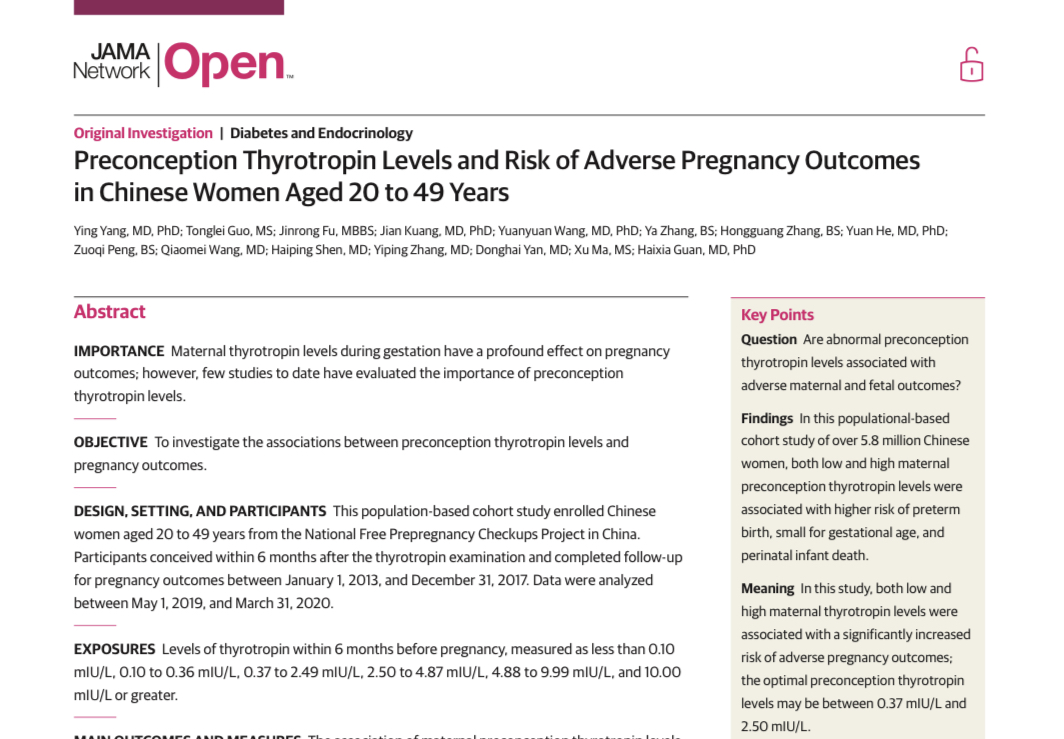

Several studies have confirmed that abnormal maternal thyroid function in early pregnancy is associated with some adverse pregnancy outcomes such as miscarriage, preterm birth, perinatal complications, and impairment of fetal neurological and intellectual development. Considering that women who are planning for pregnancy may enter pregnancy at any time, it has been suggested that the window for prevention and intervention of thyroid disorders in the period of pregnancy should be shifted from pregnancy to the preconception period. However, is preconception thyroid function associated with adverse maternal and fetal outcomes, and does the reference range of serum thyroid stimulating hormone (TSH), an important indicator of the thyroid function at this stage, need to be set specifically? There are no clear answers to these questions.
On April 13, 2021, Prof. Haixia Guan and Prof. Jian Kuang of Endocrinology Department of our hospital, in collaboration with the National Institute of Science and Technology, NHC, published a research paper entitled “Preconception Thyroid-Stimulating Hormone Levels and Risk of Adverse Pregnancy Outcomes in Chinese Women Aged 20 to 49 Years” in JAMA Network Open, which investigated the association between serum TSH levels within 6 months before pregnancy of women and four types of adverse pregnancy outcomes.

This study enrolled more than 5.84 million women aged 20-49 years (mean age of 26 years) in China, all of whom had successfully conceived within 6 months after the TSH measurement. The adverse pregnancy outcomes assessed in the study include preterm birth (PTB), small for gestational age (SGA), birth defect, and perinatal infant death. The study first calculated the TSH reference range of 0.37-4.87mIU/L for the preconception female population based on the currently recognized method (American Institute of Clinical Biochemistry). Among the cohort of study, 3.82% had a subnormal TSH level and 2.52% had a supranormal TSH level. The incidence for PTB, SGA, birth defect and perinatal infant death were 6.56%, 7.21%, 0.02% and 0.33%, respectively. After adjusting for several confounding factors such as education, history of smoking and drinking, preconception body mass index (BMI), history of thyroid diseases, history of hypertension and history of diabetes, a J-shaped association was found between TSH levels within the 6 months before pregnancy and the risks of PTB, SGA and perinatal infant death, i.e., either higher or lower TSH levels increased the risk of adverse pregnancy outcomes.
This study is the first large-scale population-based cohort study to date to investigate the association between preconception thyroid function and pregnancy outcomes, providing a high-quality basis for safeguarding the health of women planning for pregnancy in China, developing reasonable criteria for the assessment of abnormal preconception thyroid function, and guiding clinical interventions for abnormal preconception thyroid function in women. The study has the following important clinical guiding significance:
A reference range of serum TSH based on a large number of sample data of women planning for pregnancy in China is provided, namely 0.37-4.87mIU/L. This range is close to the reference range of TSH in non-pregnant general adult population (usually in the range of 0.35-5.0mIU/L).
Serum TSH below or above the normal range within 6 months before pregnancy is associated with an increased risk of adverse pregnancy outcomes and should be taken seriously and managed effectively.
Those with the serum TSH in the range of 0.37-2.49mIU/L within 6 months before pregnancy have the lowest incidence of adverse pregnancy outcomes and it can be considered as the optimal TSH range. This result strongly supports the current Chinese and foreign guideline recommendations that “LT4 dose should be adjusted to achieve a serum TSH level between the lower limit of the normal reference range and about 2.50mIU/L for women with clinical hypothyroidism before they are planning for pregnancy”.
For those with no history of hypothyroidism before pregnancy and TSH in the range of 2.50-4.87mIU/L within 6 months before pregnancy, there is no clinically significant increase in the risk of adverse pregnancy outcomes compared to those with the optimal TSH range (0.37-2.49mIU/L). Therefore, there is no need to intervene and control the TSH levels in this group of women planning for pregnancy to be below 2.5mIU/L.
The first corresponding author of this study is Prof. Haixia Guan of the Endocrinology Department, and our hospital is the first corresponding author’s employer; Prof. Jian Kuang of the Endocrinology Department is one of the main contributors to this study. The team at the Endocrinology Department will continue to cooperate with the National Institute of Science and Technology, NHC to carry out more exploration in the management of thyroid diseases in the perinatal period.